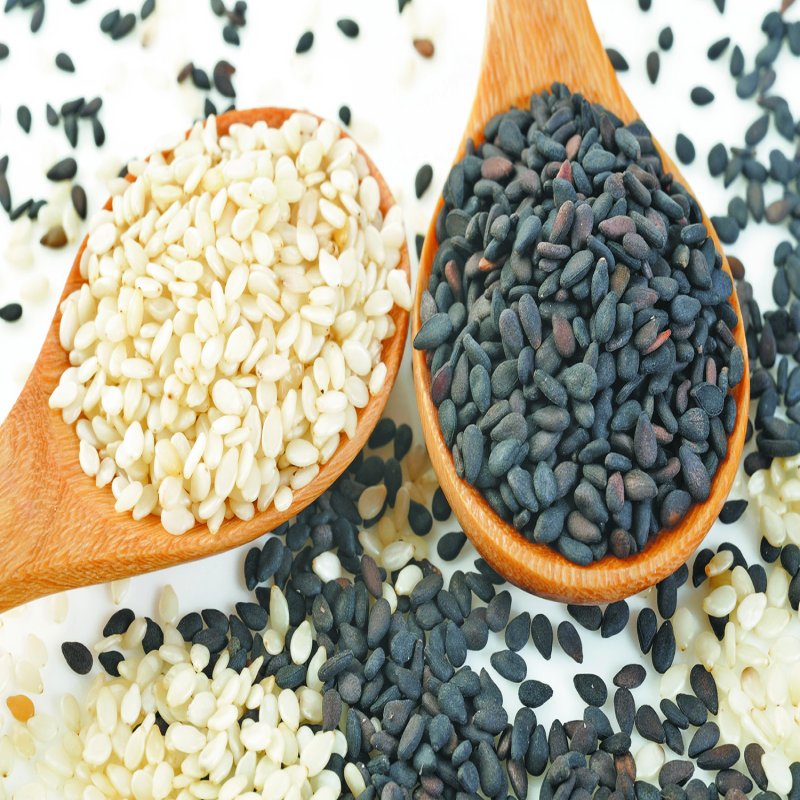
Sesame seeds not only offer culinary benefits but are also good for our health. Sesame seed oil is an Ayurvedic Super Healer – meaning the oil is used to make many of the Ayurvedic formulas. The wonder oil has different uses in the body. Sesame seeds can be used to relieve constipation and for treatment of mouth ulcers and bad breath. There’s much more to sesame than you might think of.
Sesame seeds are known as ‘Til’ in Hindi and Bengali, ‘Nuvvulu’ in Telugu, ‘Ellu‘ (Tamil, Malayalam, Kannada and ‘Teel‘ in Marathi and are the oldest condiment known to mankind. They are nutty and fragrant. They add a lovely crunch and a nutty flavor to foods.

Sesame seeds are scientifically known as Sesamum indicum and are derived from a plant of the Sesamum genus. These seeds have been cultivated for over 3,500 years and are considered the world’s oldest oilseed crop. Evidence suggests sesame seeds are native to Africa and India.
- The sesame plant is known as the “survivor crop” as it can keep growing even in a drought.
- The seeds are used in sacred rituals in India.
- Sesame is gluten-free.
Sesame seeds come in a wide variety of colors, depending on the variety or strain of the plant. These are available both shelled and unshelled. You can add them to salads or use them as an ingredient or topping for bread and grain products, crackers, sushi, cakes, soups, breading for fish and meat, and a wide variety of other applications.
Health Benefits of Sesame
The health benefits of sesame are due to its oil, which is present in higher concentrations in sesame seeds than in any other oilseed crop in the world. Use sesame seed oil to alleviate joint pains, as hair oil, or as a massage oil for babies (before bath).
Sesame seeds have the ability to prevent diabetes, lower blood pressure, prevent a wide variety of cancers, build strong bones, protect against radiation, and improve heart health. They also cure sleep disorders, improve digestion, reduce inflammation, and boost respiratory health.
Other health benefits include improving blood circulation, detoxifying the body, and eliminating depression and chronic stress. Sesame seeds contain natural oils, organic compounds, vitamins, and minerals such as calcium, iron, magnesium, phosphorus, manganese, copper, zinc, fiber, thiamin, vitamin B6, folate, protein, and tryptophan.
Let’s have a look at the health benefits of sesame seeds.
Fights Inflammation
The high content of copper in sesame seeds has several valuable functions, such as reducing inflammation in joints, bones, and muscles as well as arthritis pain. A study published in 2015 observed that patients suffering from knee osteoarthritis had significantly fewer inflammatory chemicals in their blood after eating sesame seed powder every day for a duration of 2 months.

Boosts Metabolic Function
Sesame seeds contain lignans that enhance fat burning by increasing liver enzymes which in turn improves your metabolism. Several studies suggest that the rich source of proteins and fatty acids in sesame seeds also improves metabolism. Additionally, the high fiber content in sesame seeds can help improve the digestion process and boost metabolism.

Improves Oral Health
The antibacterial and astringent effects of sesame oil can help improve oral hygiene. Studies show that oil pulling with sesame oil can boost overall oral health by reducing the amount of S. mutans (germ) count in both mouth saliva and teeth plaque. Oil pulling is an Ayurvedic remedy for oral health and detoxification that involves the use of pure oils as agents for pulling harmful bacteria and other organisms out of the mouth, teeth, gums, and even throat.

Manages Diabetes
The presence of magnesium in sesame seeds correlates to a reduced risk of diabetes. It also helps maintain the blood sugar levels of diabetic individuals.

Additionally, studies show that sesame seed oil can improve the effectiveness of various medications like glibenclamide in patients suffering from type 2 diabetes. This also regulates the insulin and glucose levels in the body, managing the symptoms of diabetes.
Know how to manage diabetes here!
Protects against Cancer
Sesamol present in sesame seeds has been associated with DNA protection against the harmful effects of radiation. Radiation exposure can occur from accidental sources or from cancer treatments involving chemotherapy and radiation therapy. Sesamol prevents DNA mutations arising due to radiation, boosting strength and reducing the risk of certain cancers.

Slows Down Aging
As mentioned, sesame seeds contain high levels of zinc, a component essential for collagen formation. Collagen is the main structural protein present in your skin and other connective tissues that provide elasticity to the skin. This makes your skin appear more youthful and healthy.

Additionally, sesame seed oil can reduce the appearance of burns and marks on the skin. It also fights premature aging which can cause wrinkles, dark spots, and dry skin among other symptoms.
Read about the role of antioxidants in anti-aging here!
How to Eat Sesame Seeds?
Eating soaked and crushed sesame seeds is more beneficial for the body. It is even more effective when you eat them in the morning. Soak sesame in water for the whole night and crush them to prepare a paste. Mix 20-25 grams of palm sugar (unrefined sugar) in 50 to 100 grams of this paste. Eating this daily can provide minerals and vitamins to your body.
You can add sesame seeds to your cereals, noodles, or rice. You can also mix it with yogurt or your favorite smoothie to add a nutty flavor. Soaking sesame seeds overnight aids in the absorption of calcium and minerals from the seeds. It also reduces the effect of oxalic acid, which can prevent the absorption of certain nutrients.
You can use sesame seeds in the following ways:
- Add sesame seeds to the batter the next time you make homemade bread, muffins, or cookies.
- Sesame seeds also add a great touch to steamed broccoli and other vegetables.
- Add sesame paste (tahini) to toasted bread and drizzle it with honey for a sweet treat.
- You can also add toasted sesame seeds as a dressing for salads, vegetables, and noodles.
- Sauté chicken with sesame seeds, soy sauce, garlic, ginger, and your favorite vegetables for a healthy but quick dinner.
Disclaimer: Excessive consumption of sesame seeds can cause irritation in the stomach and colon. Anaphylaxis is an extreme case of allergy caused by sesame seeds. It mainly causes wheezing, hypotension, and chest tightness and gradually blocks the throat and airway of the affected individual.
Nutritional Information
100g of sesame seed provides 565 Calories, Carbs – 26g (Dietary Fibre – 14g), Protein – 17g, Fat – 48g (saturated fat – 6.7g), Sodium – 11mg
And a percentage daily value of Vitamin A – 0%, Vitamin C – 0%, Iron – 82%, Calcium – 99% (based on a 2000-calorie diet).



.png)


